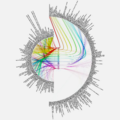How to tackle scarce data and high dimensionality in machine learning? Juho Piironen brings novel techniques to predictive modeling

Researchers in many different fields encounter research problems in which data are scarce, but the number of features is large. An illustrative example is gene expression datasets where expressions of specific genes are either high or low for cancer samples and vice versa for controls. Due to small sample sizes, these problems are usually characterized by high uncertainty. These are exactly the problems where Juho Piironen’s doctoral dissertation and its novel methods can help.
In his thesis, Juho applies Bayesian statistical inference methods, which have gained popularity during the recent years. The fundamental aim is to build models in which given new feature values can predict the associated target variable as accurately as possible (e.g. specific gene variations predict prevalence of cancer), but also to find out which features are relevant for the prediction. Bayesian methods provide a systematic framework accounting for uncertainty, but they also allow incorporation of prior information into the model.
Despite all these benefits, Bayesian inference can be computationally demanding. To mitigate this burden, Juho developed techniques that can scale to a large number of features and improve feature selection and prediction accuracy. “The most valuable contributions of my thesis are clearly methodological, but I could think of several potential application areas in both research and industry where these methods can be of great utility”, Juho says.
During his studies at Aalto University, Juho majored in applied mathematics, but selected computational science as his minor. His growing interest in machine learning led into a Master’s thesis project and finally expanded into doctoral thesis. Juho’s supervisor is Professor Aki Vehtari, who is currently a co-leader in the Probabilistic Machine Learning research group.
”The topic of my doctoral dissertation is rather narrow in the broad field of machine learning, but I have learned a lot about the field and research in general”, Juho describes his four years of doctoral studies. While finalizing his thesis, Juho worked on his open source code, which took several months. “The work was intensive but very valuable as it allows a wider research community to make use of these methods and opens new avenues for further methodological development as well”, Juho explains.
Juho hopes he will be able to work with machine learning also in the future. He has continued working in the field, but is now focusing on neural networks at Curious AI company. “Nowadays it is also possible to do research and publish while working in industry. At the moment it is just rewarding to work with the topics close to my interests and expertise”, Juho concludes.
MSc (Tech.) Juho Piironen will defend the dissertation "Bayesian Predictive Inference and Feature Selection for High-Dimensional Data" on Friday 24 May 2019 at 12 noon in Aalto University School of Science, lecture hall T2, Konemiehentie 2, Espoo.
Link to the electronic version of the thesis
Link to Lectio Praecursoria in the defense
Contact information: juho.piironen@aalto.fi
Update on 9.11.2020:
Juho Piironen has received national doctoral dissertation award (Tietotekniikan tutkimussäätiön väitöskirjapalkinto) for his dissertation "Bayesian Predictive Inference and Feature Selection for High-Dimensional Data".
Department of Computer Science
We are an internationally-oriented community and home to world-class research in modern computer science.
Probabilistic Machine Learning Group (external link)
We develop new methods for probabilistic modeling, Bayesian inference and machine learning. Our current focuses are in particular learning from multiple data sources, Bayesian model assessment and selection, approximate inference and information visualization.

Read more news

A sustainable city is also age-friendly
Cities must involve older adults more strongly in the planning of the urban environment.
Renate Zhang’s journey in optimising the cost of creation
During the research program at Aalto University, Renate Zhang developed a cost-saving method that inspired her to pursue a doctoral degree.
Chinonyelum Igwe’s contribution to the frontier of medical AI
Chinonyelum Igwe pursued her dual passions for medicine and AI through the AScI International Summer Research Programme






